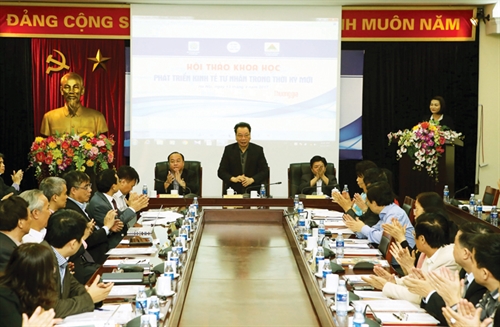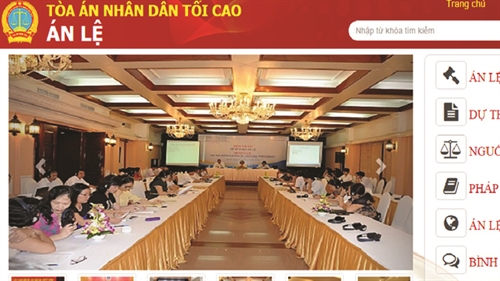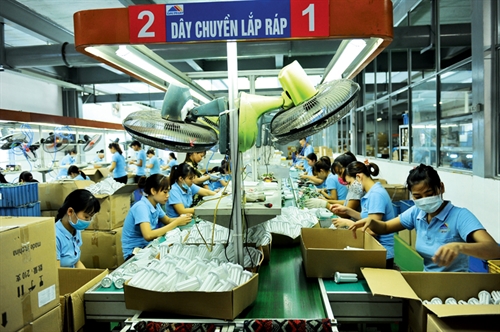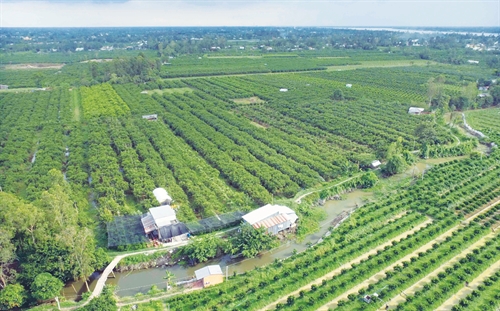Prof. Dr. Do The Tung
More positive perception on the position and role of the private economy
Changes in the perception of the Communist Party of Vietnam (CPV) on the private economy are reflected in the Party’s documents. More than sixty years ago, at a meeting held on September 5-7, 1954, the CPV’s Political Bureau issued a resolution affirming: “Private industry and trade will be protected by law. Landlords’ industrial production and trade will not be touched either. Any industrial and trade activities that are beneficial to the national welfare and people’s livelihood will be encouraged to be restored and developed.”
Thanks to this correct policy, by 1959, Northern Vietnam basically fulfilled the task of restoring the economy to a level approximately equal to that of 1939.
However, the Political Report of the CPV Central Committee presented at the 3rd National Party Congress on September 5, 1960, states “To abolish capitalist relations of production and transform the bourgeois into workers in the socialist regime.”
The 4th National Party Congress (opened on December 14, 1976) made an assessment that the abolition of private ownership and the establishment of the socialist ownership in two forms, all-people ownership and collective ownership, were the greatest achievement.
The hasty abolition of the private economy was one of the main causes of the socio-economic crisis that broke out in the late 1980s.
The 6th National Party Congress, held in 1986, the event that ushered in the period of doi moi (renewal) in Vietnam, albeit admitting the mistake of not recognizing a multi-sectoral economy, set out the policy that “the State will permit petty bourgeois to use their capital and technical and managerial knowledge to organize production and business in some production and service sectors in necessary places nationwide. The size and scope of operation of private capitalist economic units shall be regulated depending on the business and production sectors and commodities,” and “in the field of circulation, private capitalist trade must be abolished.”
It was not until the 6th meeting of the 6th Party Central Committee did the Party recognize: “The private economy, including the private capitalist economy, can develop in accordance with law without any limitations on scope and geographical area in the country and is permitted to operate in various fields… Private production establishments of certain sizes that meet certain conditions may conduct import and export transactions and directly cooperate in production with foreign partners.”
The above correct policy made important contributions to the enormous achievements of the doi moi cause, helping the country overcome the socio-economic crisis.
The Resolution passed at the fifth plenum of the 9th Party Central Committee on “Renewing mechanisms and policies to encourage and facilitate the development of the private economy” determined: “Developing the private economy is a long-term strategic issue in the development of a socialist-oriented multi-sectoral economy.”
The Resolution recently adopted at the fifth meeting of the 12th Party Central Committee set out the guiding viewpoint: “Developing a healthy private economy under the market mechanism is an objective requirement, both imperative and long-term, in the process of completing institutions and developing the socialist-oriented market economy in our country, is an important solution to liberalizing productive forces, and mobilizing, distributing and utilizing effectively resources for development.” “The private economy is an important force to drive economic development.” “The private economy will be developed in all sectors and fields not banned by law.”
Types of the private economy
The Political Report of the Party Central Committee presented at the 6th National Party Congress stressed: “Stemming from our country’s practice and being the application of Lenin’s view of considering a multi-sectoral economy a typical characteristic of the transitional period”, “small commodity production economy (consisting of artisans, individual farmers, and individual traders and service providers); private capitalist economy; and state capitalist economy in various forms, including state-private cooperation”, are defined as three economic sectors related to private economy.
The Resolution adopted the fifth plenum of the 9th Party Central Committee put forth another definition: “The private economy is composed of small-owner individual economy and private capitalist economy, operating in the form of individual business households and various types of private enterprises…”, combining small private producers and large private producers into one sector.
It should be noted that for a backward self-sufficient economy based on agriculture, small commodity production was a driving force for socio-economic development, But, as Marx and Engels clearly pointed out in the Manifesto of the Communist Party: The development of industry already destroyed and was still destroying the ownership of petty bourgeois and small peasants. Should small, scattered private production be still maintained, it is impossible to carry out industrialization and modernization. On the other hand, small commodity production should not be confused with the trend of vigorous development of small- and medium-sized enterprises within the modern social distribution system of large commodity production.
The Resolution of the fifth plenum of the 12th Party Central Committee on development of private economy sketches out three types of private economy. The first type is large private economic groups operating in multiple sectors and capable of competing on domestic and international markets. These groups are encouraged to develop into multi-owner ones that may contribute capital to state-run economic groups, which will be capable of participating in regional or global production networks and value chains. (Here, it is again necessary to make clear whether it is an objective and inevitable trend to merge private capitalist economy and state economy into state capitalist economy).
The second type is small-scale private economy, mainly includes production and business households with still low technology, governance skills, financial capacity, product quality and competitiveness. These households should be provided with favorable conditions to voluntarily associate together into cooperative organizations or to operate after enterprise model. In agriculture, they should mainly develop into enterprises, cooperatives or large farms applying high technologies. In a nut shell, small-scale production must be developed into large-scale commodity production.
The third type is small- and medium-sized enterprises which are operating under the market mechanism and participating in production networks and value chains of large enterprises. What needs to be done here is to improve and ensure transparent and effective implementation of policies on support for the development of these enterprises and the movements of startup, renovation and creativity to create a premise for forming mixed-ownership private economic groups.
 |
| Vietnam Chamber of Commerce and Industry holds a scientific workshop on development of the private economy in the new period__Photo: Nguyen Dan/VNA |
Contributions of the private economy to national development
The private economy has sustained a relatively high growth rate, accounted for 39-40 percent of GDP and employed some 85 percent of the workforce, playing an important role in mobilizing social resources for investment in production and business development. The pool of businesspeople has become larger and stronger.
However, the private economy still fails to be a driving force of economic growth due to many weaknesses. The growth of the private economy tends to slow down in the recent years. The private economy remains small in scale, mostly based on the household economy. Many private businesses have shut down or fallen bankrupt. Law-breaking and unfair competition acts in the private economy are rather common. Cases of environmental pollution, unsafe and unclean food and trade fraud still occur in a serious and complicated manner. Many private businesses fail to ensure the interests of their workers, owe social insurance premiums, make untruthful financial statements and evade taxes. There have appeared unhealthy relationships between private businesses and state authorities to intervene into the policy making and implementation and form “group interests”, causing bad socio-economic consequences and eroding the people’s trust.
Solutions to boost sound development of the private economy
The method of state management of the private economy has been renewed to better suit the market mechanism but still produced limited results. So, the State must abolish all barriers and prejudices to and create every favorable condition for the sound and proper development of the private economy. It is necessary to bring into full play the private economy’s positive aspects beneficial to the country while intensifying examination, inspection, supervision and control to limit and prevent its negative aspects, particularly preventing and fighting all manifestations of “crony capitalism” and “group interests” as well as unfair competition.
The system of laws, mechanisms and policies has step by step been improved but remains asynchronous. Many regulations on the private economy have not been strictly enforced.
The right to freedom of enterprise, property rights and access to business opportunities and social resources are not truly equal between the private economy and other economic sectors. Private businesses still have to pay many under-the-table costs; administrative procedures are still cumbersome; and acts of harassment and abuse of powers to cause difficulties to businesses remain common. Inspections and examinations of activities of the private economy produce poor results.
So, in order to boost the rapid and sound development of the private economy, the State needs to improve the legal system as well as mechanisms and policies, creating a favorable investment and business environment and expanding the possibility to participate in various markets and access to various resources for the private economy. It should also support the private economy in renovating, creating and modernizing technologies, developing human resources and raising labor productivity.-









